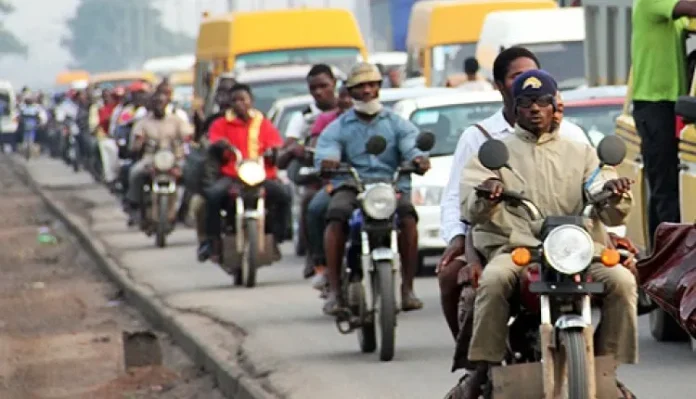
Ghana’s government is advancing plans to legalize commercial motorcycle transport, known as okada, through a comprehensive licensing framework being developed by the Driver Vehicle Licensing Authority (DVLA).
Kelvin Caternor, Deputy Director for Planning, Monitoring and Evaluation at DVLA, announced the reforms at the Motor Riders Day Rally on Sunday, November 23, 2025. The event, organized by the National Christian Men’s Forum in partnership with 11 Christian men’s groups, brought together hundreds of riders eager to understand how the anticipated changes could reshape commercial motorcycle transport in Ghana.
Commercial riders will be required to pass an oral test, a theory test, and an eye test to ensure they become responsible road users, Caternor explained. Each motorcycle will receive a unique registration plate to simplify identification by law enforcement, while mandatory helmets with unique identification numbers will be required for both rider and passenger.
The measures aim to professionalize the activities of okada riders, enhance accountability, and protect their livelihoods. Okada services are already commonplace across Ghana, especially in Accra, where people use them mainly to escape traffic jams and for goods delivery. However, their operations remain illegal under current regulations.
Transport Minister Joseph Bukari Nikpe has directed DVLA to commence the registration and licensing of motorbikes for commercial use with immediate effect. During a working visit to DVLA’s head office in February 2025, the minister stated that legalizing motorbike use for commercial purposes would help reduce indiscipline on roads.
The move fulfills a major campaign promise by the ruling National Democratic Congress (NDC). During the 2024 election campaign, President John Dramani Mahama pledged to legalize okada operations, stating the promise was included in the NDC’s 2024 manifesto.
Cabinet has given the green light for a bill proposing okada legalization to be laid in Parliament for approval. The initial age limit qualification for okada riders has been reduced from 25 years to 21 years in preparation of the legislation.
The regulatory framework requires operators to belong to recognized unions, with membership linked to the right to operate. Unions will work with DVLA to train and certify riders, ensuring they are qualified to carry passengers. An ordinary motorbike riding license will not suffice for passenger transport; riders must obtain specialized commercial licenses.
Nikpe stated that significant progress is expected by the end of the first quarter of 2025, with full implementation following parliamentary approval of the legislative changes to the Road Traffic Regulations, 2012 (Legislative Instrument 2180), which currently prohibits commercial use of motorbikes.
The legalization effort comes as transport challenges continue to burden urban areas. Traffic congestion remains a significant problem in Accra and other major cities, making okada an attractive alternative for many commuters. The government’s approach seeks to balance mobility needs with road safety concerns while providing economic opportunities for thousands of riders.
Industry observers estimate the okada business employs hundreds of thousands of Ghanaians. During his 2024 campaign, Mahama referenced figures suggesting over 1.7 million people were engaged in okada operations.
The DVLA has reserved space at its Accra Regional Office to facilitate training and testing of okada riders around the clock to register all operators. Minister Nikpe also urged DVLA to leverage technology to enhance operations and eliminate the activities of middlemen known locally as “goro boys”.
Ghana’s regulatory approach mirrors efforts in other African countries. The government has studied regulatory approaches in countries including Rwanda and intends to apply lessons from those experiences. The framework aims to make it easier to monitor riders and enforce discipline at traffic points and junctions.
